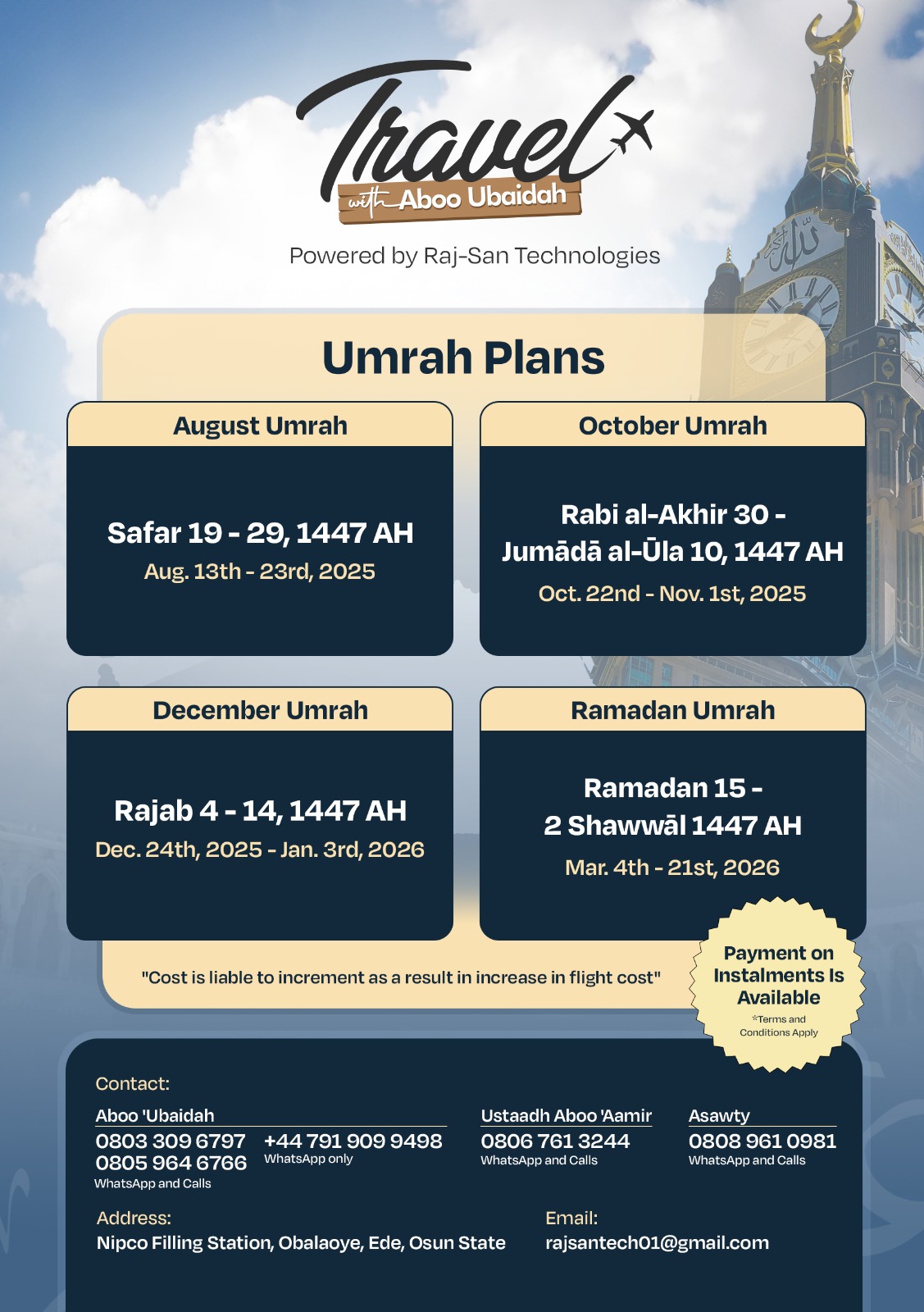[Animal for Sacrifice]
Click HERE to downlaod the complete PDF
Al-Ud'hiyah is the animal that is slaughtered on the occasion of Eidul-Ad'ha as a means of nearness to Allâh the Mighty Lord on the Day of Sacrifice or days of Tashreeq (the three days after the Eid). They include sheep, goat, cow and camel.
Ash-Shaykh Al-Uthaymeen (may Allâh bestow mercy on him) said it is called Ud'hiyah because the slaughter takes place at Duha (forenoon). See Fat'h Dhil-Jalaal (6/68).
Getiing a Ud'hiyah is obligatory upon whoever has the means thereof. Aboo Hurayrah (may Allâh be pleased with him) narrated from the Messenger of Allâh - salaLlaahu alayhi wa sallam - that he said, 'Whoever has the means to slaughter an animal but does not do so, he should never come near our praying place.' The report is hasan as recorded by Al-Imaam Ahmad (1/321), Ibn Maajah (3123) and others.
Ash-Shaykh Al-Uthaymeen (may Allâh bestow mercy on him) also favoured the view that getting a Ud'hiyah is obligatory upon whoever has the means thereof as said by Shaykhul-Islaam Ibn taymiyyah (may Allâh bestow mercy on him). See Fat'h Dhil-Jalaal (6/68).
That the Messenger of Allâh (salAllâhu alayhi wa sallam) said whoever has the means to slaughter but does not slaughter should not come to the Musalla signifies that the person has failed to render what is obligatory upon him towards Allâh – the Mighty.
The opinion that Ud'hiyah is not obligatory upon whoever has the means of slaughter is very weak.
Note: It is in the Sunnah of the Prophet (salAllâhu alayhi wa sallam) that whoever wants to slaughter in Eidul-Ad'ha should not remove any hair from his body. This is due to what is reported by Umm Salamah (may Allâh be pleased with her) from the Prophet (salAllâhu alayhi wa sallam) that he said,
'When the ten days of Dhul-Hijjah enter, whoever wants to slaughter an animal should not remove any hair or nail from his body.' Recorded by Muslim, Ahmad and others.
All forms of removal are prohibited.
Among the rulings pertaining to the Ud'hiyah are the following:
The slaughtering should be after the observance of the Eid Prayer. Not necessarily after the slaughter of the Imaam at the Musalla, Allâh knows best.
The Messenger of Allâh (salAllâhu alayhi wa sallam) said 'Whoever slaughters before the Prayer then that is no slaughtering rather some mutton he presented to his family.' Al-Bukhaaree and Muslim recorded it on the authority of Al-Baraa bn Aazib – may Allâh be pleased with both.
If it is ram that will be slaughtered, then it must have reached a year, some said six months but the first view is the view of the majority of the scholars. That is the meaning given to al-Jadha'ah by Al-Haafidh Ibn Hajar (may Allâh bestow mercy on him) in Fathul-Baaree (5/10) as quoted in Ahkaamul-Eidayn. If it is camel then it must have attained five years of age. A goat must have entered the second year. Cow is two years going to three. See also Al-Wajeez Fee Fiqhis-Sunnah Wal-Kitaabil-Azeez p.501.
The slaughter can be delayed to the second and third day after the Eid. Said the Messenger of Allâh (salAllâhu alayhi wa sallam), 'All the days of Tashreeq are for slaughter.' Al-Imaam Ahmad (may Allâh bestow mercy on him) and others recorded it. The hadith is singularly weak but with combination of its routes it becomes authentic as said in Ahkaamul-Eidayn where Nas'b Ar-Ra'yah (3/61) was quoted.
The animal to be sacrificed must be safe from all forms of illness and impairment. For instance, an animal whose ear is cut (in the front or rear or in any other vivid form) or whose horn is broken is not good. So also is animal which has lost an eye or both.
Al-Baraa bn Aazib (may Allâh be pleased with him) said the Messenger (salAllâhu alayhi wa sallam) told them four categories of animals are unsuitable for slaughter, 'The animal whose eye defect is very clear, the animal whose ill-health is clear, the limping animal with clear limping and animal with broken leg that cannot walk.'
Al-Baraa (may Allâh be pleased with him) added, 'I hate that there should be any defect in the ear; whatever defect you see in the ear then leave the animal but do not forbid it for anybody.' [Saheeh Ibn Maajah: 2536 as quoted in Al-Wajeez p.501].
Al-Imaam An-Nawawee (may Allâh bestow mercy on him) said: '[Scholars] agree that the four defects mentioned in the hadith of Al-Baraa means that any animal that possesses them cannot be slaughtered; the same thing applies to any animal that has any similar defect or worse.' Shar'h Muslim (13/120) as quoted in Al-Wajeez p.501.
The author of Ahkaamul-Eidayn (pp.75-76) brought a narration saying a castrated ram can be slaughtered. That is the narration from Aboo Ya'laa and Al-Bayhaqee graded to be hasan by Al-Imaam Al-Haythamee in Majmaz-Zawaaid(4/22).
A slaughter is enough for a household. They should eat from it, make gifts to friends and give the poor from it. They can equally store part of it till anytime. The Messenger of Allâh (salAllâhu alayhi wa sallam) said: 'Store and give the poor…' Al-Bukhaaree, Muslim and others recorded it.
Ataa bn Yassaar (may Allâh bestow mercy on him) said he asked Aboo Ayoob Al-Ansaaree (may Allâh be pleased with him) about people's slaughter in the time of the Messenger of Allâh (salAllâhu alayhi wa sallam), and he said, 'One man would slaughter a goat for himself and members of his family; they would all eat and give others to eat.' Al-Bayhaqee reported it with a sound chain as said by the author of Ahkaamul-Eidayn (p.76).
Meanwhile, a camel or cow can be jointly killed by seven people. Jaabir bn Abdillâh (may Allâh be pleased with him) said: 'Seven of us slaughtered a camel and a cow at Hudaybiyyah.' Muslim (350). If the economy is not favourable, ten people can jointly kill a camel as apparent in the hadith of Abdullaah bn Abbaas (may Allâh be pleased with him), he said, 'We were on a journey with the Messenger of Allâh (salAllâhu alayhi wa sallam) then it was time for Eidul-Ad'ha, ten of us jointly slaughtered a camel, and seven a cow.' Ibn Maajah (2536) and others collected it.
Before slaughtering the animal, the knife to be used must be well sharpened and hidden from the animal, out of mercy for it. A well-sharpened knife will ease the passage of the animal, and that is what the Messenger of Allâh (salAllâhu alayhi wa sallam) did enjoin.
Shadaad bn Aus (may Allâh be pleased with him) said, the Messenger of Allâh (salAllâhu alayhi wa sallam) said, 'Allâh has decreed goodness to all things; when you kill do the killing well, when you slaughter, slaughter well. Let one of you sharpen his knife well and let the slaughter die well.' Recorded by Muslim (1955).
It is a sharp object like knife, axe, cutlass, etc, that can be used. It is forbidden to use the nail and the teeth. Al-Bukhaaree (2488) and Muslim (1967) recorded a hadith forbidding that, in this wording, '…so far it (the object) causes a blood flow, then eat (the slaughter), if the object is not a tooth or a nail… '. See Al-Mulkhas Al-Fiq'hee (p.612).
Also when slaughtering the animal, the pharynx, the gullet and one of the jugular veins must be well cut. See Al-Mulkhas Al-Fiq'hee (p.612).
It is recommended to say Allâhu-Akbar and Bismillaah when one wants to slaughter.
Anas bn Maalik (may Allâh be pleased with him) said the Messenger of Allâh (salAllâhu alayhi wa sallam) slaughtered two horny, whitish (with little black spots by the hooves and eyes) rams with his hand, he said Allâhu-Akbar and Bismillaah when he wanted to slaughter them, and that he placed his leg on their flank.
Ash-Shaykh Muhammad Saalih Al-Uthaymeen (may Allâh bestow mercy on him) said it is obligatory to say Bismillaah but optional to say Allâhu-Akbar. See Fat'h Dhil-Jalaal 6/74.
Ash-Shaykh Muhammad Saalih Al-Uthaymeen (may Allâh bestow mercy on him) also said it is not correct to tie the legs of the animal when it is to be slaughtered. Also that the animal can be placed in any position easier for the slaughterer but better to place it on the right hand side. See Fat'h Dhil-Jalaal 6/73.
[But when Ash-Shaykh Al-Uthaymeen (may Allâh bestow mercy on him) was asked regarding animals that cannot be slaughtered except they are tied in the legs, he said there is no problem with tying them in the legs if it is difficult to slaughter them. See Fat'h Dhil-Jalaal 6/63.]
So also when slaughtering the animal, it can be made to face the Qiblah or otherwise. There is no report traceable to the Prophet (salAllâhu alayhi wa sallam) about that but scholars favour the view of making the animal to face the Qiblah because it is an act of worship! Ash-Shaykh Muhammad Saalih Al-Uthaymeen (may Allâh bestow mercy on him) advised the learners to let the general people know that it is not part of the Sunnah to say the slaughter must be made to face the Qiblah. See Fat'h Dhil-Jalaal 6/63.
The best slaughter is a fat horny whitish ram with some black spots by its eyes, genital and hooves. That is the description of the ram slaughtered by the Messenger of Allâh (salAllâhu alayhi wa sallam). Ash-Shaykh Al-Uthaymeen (may Allâh bestow mercy on him) however said in Fat'h Dhil-Jalaal 6/74, when asked as to which one is better, a camel slaughtered by one person (not seven or ten) or a goat slaughtered by one person? He said one camel slaughtered by one person is better than one goat slaughtered by one person except in the case of Aqeeqah (the slaughter for a newborn) where goat is stated to be better.
It is equally recommended that the owner of the animal slaughters his animal by himself. He can also appoint another person to slaughter it on his behalf. Meanwhile, if he hires a butcher to slaughter his animal for him, he should not give him any part of the mutton.
Alee bn Abee Taalib (may Allâh be pleased with him) said, 'The Messenger of Allâh (salAllâhu alayhi wa sallam) asked me to kill his camels for sacrifice on his behalf and that I should give out their meat, leather and covering as gifts, and that I should not give the butcher anything from the meat. He (salAllâhu alayhi wa sallam) said: We will give him (something else) from ourselves.' Muslim, Aboo Daawud and others collected it.
It is only those who are alive that can slaughter. Whoever has died cannot be slaughtered for. But Ash-Shaykh Al-Uthaymeen (may Allâh bestow mercy on him) said if a son slaughters an animal with an intention that its reward should be for any of his dead parents who were Muslims, it is hoped the reward of the slaughter will meet them. See Fat'h Dhil-Jalaal 6/87.
A Good Question:
Ash-Shaykh al-Uthaymeen (may Allâh bestow mercy on him) was asked if a salary earner can borrow money to buy a ram with the intention of paying back when he collects his salary.
The Shaykh (may Allâh bestow mercy on him) answered: 'Yes he can borrow the money so as to enliven the practice of slaughtering an animal so far he is sure he would pay but whoever cannot pay should not borrow any money to get a slaughter.' See Fat'h Dhil-Jalaal 6/84.
This is the end of what Allaah the Mighty Lord has facilitated.
Also read 'A Gift to the Ummah Regarding the Two Eids of the Ummah.'

